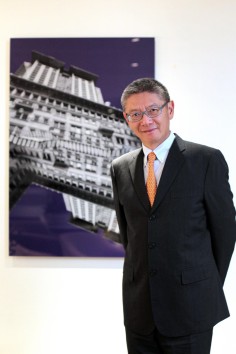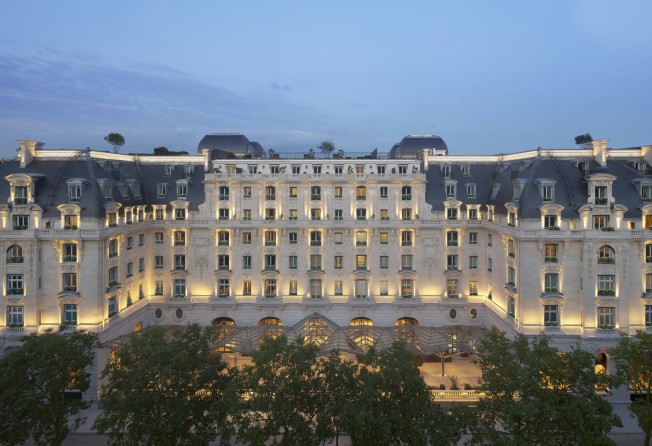
How Peninsula hotels make profits from the past
Transforming icons of the past into profit-making ventures for the future is the management challenge for Peninsula hotel boss Clement Kwok

Clement Kwok King Man has had a busy 12 months. In that time, the Hongkong and Shanghai Hotels chief executive has opened a new Peninsula hotel in Paris, signed a €300 million (HK$2.55 billion) deal to develop one in Istanbul and submitted a planning application for a landmark site in London.

"We would like to open [a new hotel] every three years or so. I have opened three hotels in my 13 years here," Kwok told the South China Morning Post, "and we are trying to do two to three in the next five to six years.
"If we are able to accomplish that, then we will have done six in 18 to 20 years of my time here, which is the right sort of balance between development and progress and spending enough time on the details of getting it right."
It is rare to interview a company chief these days whose time horizon extends much beyond the next couple of quarters, never mind the next couple of decades - a period Kwok describes as one in which a business should expect to be "riding through the shorter-term ups and downs" of the life cycle of an asset.
Then again, making a judgment about where to open an iconic Peninsula hotel is not a snap decision, especially considering that Hongkong and Shanghai Hotels (HSH) and the family behind it - the Kadoories - do not begin a transaction planning for a potential exit.
The HSH ethos is that the effort required to build a Peninsula greatly limits the desire to sell, regardless of how business conditions evolve.
"One good example is Thailand. We have a magnificent hotel in Bangkok," Kwok said. "Of course we all know that the Thai market's business has been affected in the past few years by the political unrest in the country, but we see that as all part of what you would expect if you are taking a 50-year view. You wouldn't go into a long-term investment thinking it was going to be hunky-dory for 50 to 100 years."
The same arguably applies to Beijing's two-year crackdown on corruption and conspicuous consumption, given that the biggest source of the world's new millionaires - and by extension the potentially biggest source of new Peninsula customers - is mainland China.
China created a million US dollar millionaires last year, according to research from Boston Consulting Group, taking the number of millionaire households in the country to four million.
The anti-graft crackdown, meanwhile, has hurt luxury spending across the board, hitting everything from haute couture fashion, Swiss watch sales, jewellery and high-end cars to hotel occupancy, liquor sales and banqueting.
Kwok insists HSH has not been materially affected.
"Maybe at the margin there might have been some effect, but I would say that our business generally has held up well in China and among our mainland Chinese customers," he said.
And that is partly because he says HSH is not planning to build hotels with only well-heeled mainland tourists in mind. Its core mission is to build luxury hotels in what it defines as global gateway cities.
Once we have an asset, we commit to it and we want to hold it for the long term
"Which cities do we regard as being the gateway cities to go into over a 10, 20, 30-year view? Well, that will change over time and we'll have to make that assessment at the time," he said. "We don't though see a difference between our definition of gateway cities and the destinations that Chinese and other tourists will be wanting to go to.
"When we look at a city, we analyse the current market and try to get a feel for future prospects as well. Of course, with any of these things, it is quite judgmental about which country or city one feels most optimistic about its long-term prospects.
"It is no secret that India is one place we have been looking at for some time. We don't particularly sit there thinking that we should go to a different place because of potential for tourists from mainland China. We would go ahead with destinations we think to be desirable."
Kwok says that long-term view is particularly important given that building luxury hotels in such cities is not as glamorous as it sounds, especially as HSH is generally looking for landmark sites in cities that evoke a certain imagery - and consequently the potential for reservations among existing owners, heritage conservers and others.
Opening the Peninsula Paris, the first HSH property in Europe, for example, took almost five years from signing the financing deal with the hotel's Qatari partners in 2009 to opening for business in August last year, with painstaking attention to detail needed to deliver the end result required at the outset.
"We wanted to build a hotel that had respect for the classical architecture and the classical look, but which at the same time would be one where when people walked in they would feel was a hotel built in the year 2014, not in 1908 and simply restored to what it had been before," Kwok said. "The challenge here was to marry the preservation with the modernity."
A challenge on a different scale is under way in London's Belgravia where, two years after signing a deal to acquire a 50 per cent stake in a property overlooking Hyde Park Corner, not a single brick on the existing building on the site has been touched. Nor can it be until every stage of London's notoriously rigorous planning process has been passed.
So far, that has involved drawing up plans to provide cross sections of the view of the property across every nexus to see how the building would fit with its neighbours and surroundings, then figuring out the construction impact on traffic and ensuring the "right of light" of neighbouring buildings. And that is before it got anywhere near a formal planning application, which was submitted last week.
The upside of that process, Kwok says, was that by the time the application was in, every bit of design and project planning work was done, allowing construction to begin relatively quickly once approval is granted. Building is expected to start in 2017 with completion by 2021.
Progress on the planned Peninsula Yangon, meanwhile, seems less clear cut. A deal struck with Myanmar partner Serge Pun for HSH to acquire a 70 per cent interest in the building that was formerly the headquarters of Burma Railways was supposed to have secured all necessary government approvals by March 31. That date has now been pushed back to the end of the year.
"We are of course hoping that it does not take until the end of this year to get all of those conditions satisfied, but we are giving ourselves enough time to work on that," Kwok said. "I can say to you that we are already well advanced in designing the hotel, but we cannot proceed much further until we have the right pieces of paper in our pocket from the government.
"I think I can safely say it is simply down to an administrative process. We have had meetings with very senior government officials who have all expressed great support."
But when it comes to owning and shaping a piece of history, there are no short cuts.
"What is important to us is to have a common mindset as to the product we are trying to build and in particular to the long-term commitment we have to it," Kwok said. "The biggest test is when things are not going well, but the asset still requires more investment and you need to spend despite the cash flows not coming through the hotel.
"I would dare say that we are probably more willing than most, if not all, to keep investing in a product even through a period of downturn when the immediate cash flow or the economics are not looking so good because once we have an asset, we commit to it and we want to hold it for the long term."